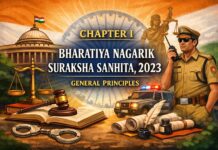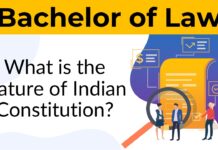Describe the scope of jurisdiction of the Supreme Court to grant special leave to appeal under Article 136 of the Constitution.
Ans. Appeals by Special leave.—The powers given by Article 136 in the nature of a special or residuary power, which is exercisable outside the purview of ordinary law in case where needs of justice demand interference by the highest court of the land. It vests in the Supreme Court plenary jurisdiction on the matter of entertaining and hearing appeals by granting special leave against-
(i) any judgment, decree, determination or order ;
(ii) in any cause or matter;
(iii) passed or made by any Court or tribunal except a Court Martial. Because, the power under this Article is a reserve power it cannot be exhaustively defined. But the decided cases prove that special leave is granted in exceptional cases where grave and substantial injustice has been done. An appeal directly from the order of the Tribunal must be dismissed because Supreme Court does not except in exceptional and special circumstances exercise its power under Article 136 of the Constitution of India in such a way as to by pass the High Court by entertaining an appeal direct from the order of the Tribunal and thereby ignore the decision by the High Court—i. T Commissioner,- Allahabad v. Lakhirant Rain Das, A. I. R. 1967 SC338. The Supreme Court itself interpreted the significance of Article 136 in its some decisions. In Harwada Dev v. State of West Bengal, A. I. R. 1965, SC 757 and in Marta v. State of U.P.A. I. R. 1971, SC 1050, the Supreme Court has held that under Article 136, the Court will grant special leave to appeal only if there has been gross miscarriage of justice or if the facts of the case were such as were shocking to the judicial conscience of the people. In the next place such leave may be granted against any order while under Article 132, it is confined to a judgment, decree or final order. Under Article 136 an appeal may lie even against an interlocutory order. In Mis. Ganesh Trading Co. v. Moji Ram, A. I. R. 1978 SC 454, the Supreme Court pointed out that court can with the orders of the interlocutory nature, if it is in order to promote uniform standards and views and to prevent obvious failure of justice. In the third and most important place and leave under Article 132 is confined to appeal from a judgment, decree or final order of the High Court only, while under Article 136 it extends to appeal from judgment, etc. of any court or tribunal except court martial, i. e„ such court may be any court subordinate to the High Court or any body which is not designated as a court but exercises judicial functions like the Industrial or Income-tax Tribunal ; while the scope of Article 132 is confined to Constitutional matters emanating from High Court judgement, that is Article 136 covers all miscellaneous matters from inferior courts and tribunals. In Bihar Legal Support Society v. Chief Justice of India, (1986) 4 S.C.C. 767 it has been held that the Supreme Court would normally–not disturb the order of the High Court and it will be final. The Court will interfere only in the limited class of cases where there is substantial question of law involved which needs to be finally laid at rest by it for the entire country, or where there is a grave, blatant and atrocious miscarriage of justice. Bhagwati J., suggested that it would be desirable to set up a National Court of Appeal to hear appeals in the country in civil, criminal, revenue and labour cases.



















